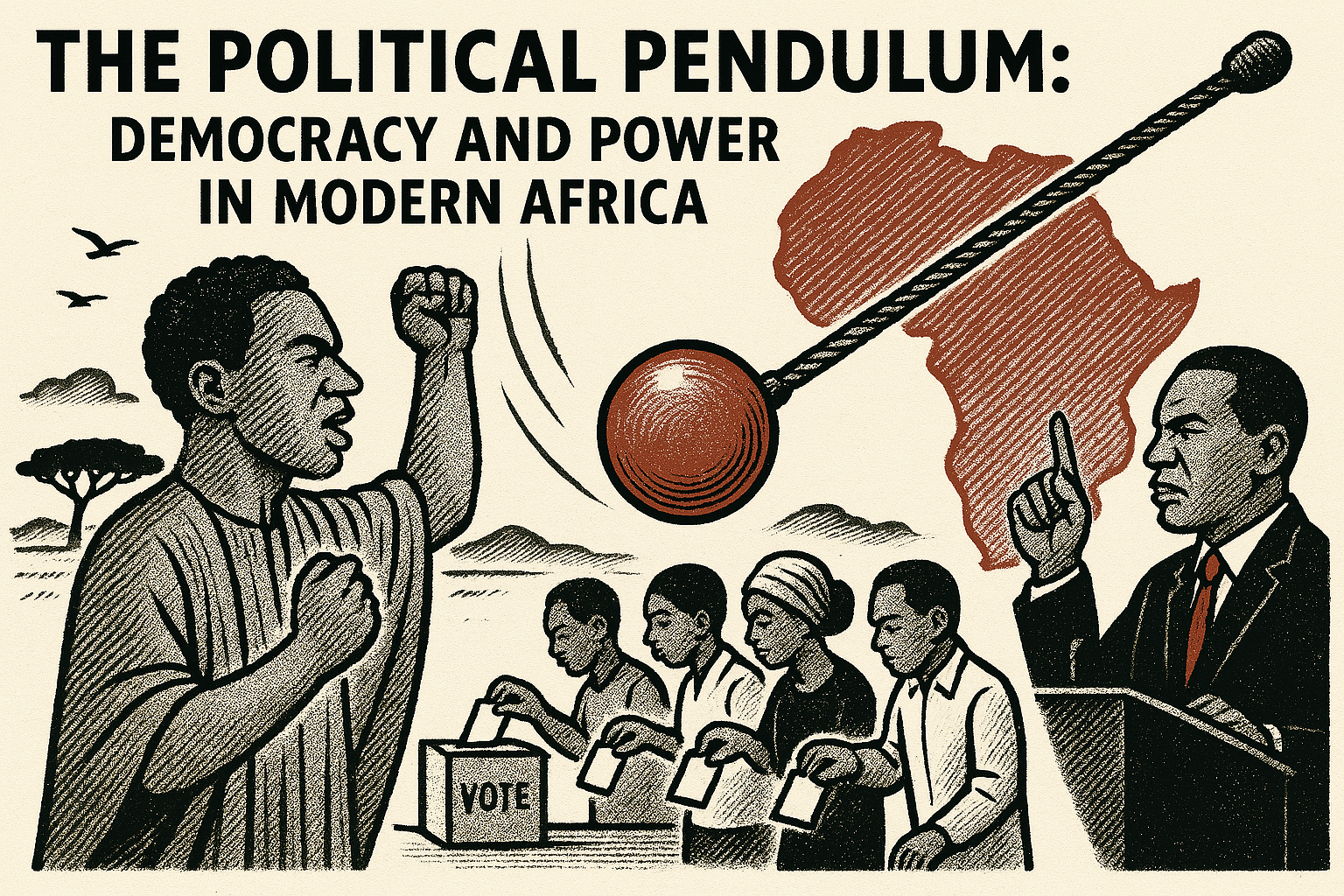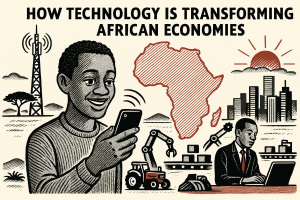On a cool morning in West Africa, voters formed a snaking line outside a modest polling station. An elderly woman, wrapped in vibrant cloth, cast her ballot with a trembling hand as the rising sun illuminated the hopeful faces behind her. Such moments of quiet determination are becoming increasingly common across the continent. Yet, behind the spectacle of ballots cast lies a more turbulent story—one of democratic awakening constantly tested by entrenched power, military ambition, and shifting global allegiances. Africa’s political trajectory is not a straight line but a swinging pendulum, tracing arcs of progress and relapse shaped by the will of its people and the resistance of its institutions.
Not long ago, the mood was buoyant. By the 2010s, multiparty elections and peaceful power transfers had become the norm in many African countries. Political scientists spoke of a “third wave” of democratization reaching the continent’s shores. Yet in recent years, this optimism has been tempered by a resurgence of coups and constitutional manipulations. In 2021 alone, four African governments were toppled by force, prompting UN Secretary-General António Guterres to warn of “an epidemic” of coups. The data is sobering: of 492 attempted coups globally since 1950, Africa has experienced 220—109 of them successful. Forty-five out of fifty-four African countries have faced at least one coup attempt in the past seven decades. Many of these have taken place in the Sahel, where weak institutions, violent extremism, and chronic underdevelopment create a perfect storm for instability.
Yet juxtaposed against these reversals are striking democratic gains. In Lesotho, competitive elections in 2022 earned it an upgrade to “Free” status by Freedom House. Kenya’s 2022 vote was hailed as its most transparent ever. Zambia’s 2021 elections saw an opposition leader defeat an incumbent, despite widespread concerns about media freedom and political violence. Across the continent, the public’s appetite for democratic governance remains strong. Surveys show that citizens in nine African countries rank among the world’s most politically engaged. From Algeria’s 2019 mass protests to Nigeria’s youth-led #EndSARS movement, Africans are not waiting passively for reforms—they are demanding them. This civic engagement has proven to be one of the continent’s most durable checks on power, even when such resistance comes at great personal risk. “People care about democracy, and they are willing to mobilize to support it,” concludes a global analysis by International IDEA.
Still, democracy’s advance is anything but assured. One of its gravest threats is the “big man” syndrome—leaders who treat the presidency as a personal entitlement. In recent years, presidents in Côte d’Ivoire, Guinea, Togo, and Comoros have all extended their terms by removing or ignoring constitutional limits. These actions often spark unrest, as in Guinea, where a term extension preceded a military coup. Currently, nearly half of Africa’s population lives under authoritarian or semi-authoritarian regimes. Freedom House estimates that only 7% of Africans reside in fully free countries, while about 50% live in places considered “Not Free.” In countries like Eritrea and South Sudan, basic rights such as assembly, speech, and opposition politics remain largely theoretical. Even in democratic contexts, problems persist—Nigeria’s 2019 elections, for example, suffered from low turnout, logistical issues, and widespread public disillusionment.
And yet, the central narrative is not one of helplessness, but of agency. Time and again, African citizens have confronted repression with protest, resilience, and ingenuity. In Sudan, a nonviolent uprising in 2019 deposed a three-decade autocracy, paving the way for a civilian-led transitional government—though later undermined by military interference. In Gambia, regional and domestic pressure forced Yahya Jammeh, a long-standing strongman, to step down after losing the 2016 election. Even in places like Uganda and Cameroon, where incumbents have ruled for nearly 40 years, youthful dissent bubbles beneath the surface, often expressed through satire, digital activism, and public defiance.
Institutions have sometimes stepped up too. The African Union and regional bodies like ECOWAS have attempted—albeit inconsistently—to enforce democratic norms. ECOWAS’s response to the 2023 coup in Niger, which included sanctions and threats of intervention, signaled a firmer stance. The African Union, through its “Silencing the Guns” initiative, has committed to curbing unconstitutional changes of government by 2030. Yet while the rhetoric is robust, enforcement remains spotty, often compromised by political alliances and a reluctance to confront peers. As scholars have noted, international frameworks cannot replace homegrown democratic development. Real change hinges on strengthening national institutions—courts that uphold constitutional limits, legislatures that resist executive overreach, militaries that serve the state rather than an individual.
Encouragingly, there are moments when such institutions deliver. Kenya’s Supreme Court nullified the 2017 presidential election, citing irregularities and ordering a rerun—a landmark decision for judicial independence. Malawi’s Constitutional Court, in an even more dramatic turn, annulled the results of its 2019 election due to widespread fraud. The opposition won the court-mandated re-run, a moment hailed globally as a victory for rule of law. These cases prove that robust institutions are not a fantasy—they are possible with political will and public pressure.
External actors have also played a dual role—sometimes encouraging reform, sometimes enabling repression. Western donors often tie aid to democratic benchmarks, as in the case of the Millennium Challenge Corporation. But China, now Africa’s largest lender, offers a competing model: infrastructure investment without political conditions. This appeals to authoritarian-leaning governments and provides them financial lifelines that bypass democratic accountability. Yet global influence is a two-way street. African nations have increasingly pushed back. When the EU sought to attach governance conditions to COVID-19 vaccine distribution, African diplomats mounted a successful protest, asserting their sovereignty and collective agency.
For all its complications, African democracy is far from the caricature of chaos or fragility it is sometimes made out to be. If anything, it is remarkably dynamic—a field of contestation where institutions, leaders, and citizens all vie to shape the future. Half of the continent’s population is under the age of 20, and this generation is more connected, more informed, and less tolerant of corruption than any before it. They coordinate cross-border protest campaigns, share organizing strategies on encrypted platforms, and follow elections as closely in Ghana as they do in their own backyards. This connectivity is cultivating not just a generation of activists, but a pan-African democratic consciousness.
What will determine whether the pendulum swings forward or back? Much depends on whether democratic governments can deliver. Where jobs are created, infrastructure is built, and education is expanded, citizens tend to reward democratic institutions with legitimacy. Where these promises go unmet, the space opens for populists and generals to step in. Combating corruption is also key. Every theft of public funds chips away at trust, making it harder for governments to build durable support. Some African nations are pioneering digital procurement and open budget platforms to reduce graft—efforts that deserve more visibility and scaling.
Equally vital is the safeguarding of civil liberties. A free press, active opposition parties, and space for dissent are the hallmarks of any resilient democracy. When citizens can criticize authority without fear, when they can organize politically and seek redress through courts or parliament, the odds of violent upheaval diminish. Many African constitutions enshrine such freedoms, but practice still lags promise. Bridging that gap is among the continent’s most urgent democratic tasks.
As the sun sets on the polling station where this story began, the votes are counted under the watch of party agents and independent observers. No matter who wins, the act of voting—of choosing—remains profoundly significant. It is an assertion of agency, a quiet defiance of despair. Africa’s political story is still being written, line by line, ballot by ballot. While setbacks persist and the struggle for accountable governance continues, the enduring belief among Africans that democracy is worth fighting for suggests a future still open to possibility. As Afrobarometer surveys show, three in five Africans continue to say democracy is the best form of government. That conviction, held not in the halls of power but in homes, markets, and streets across the continent, may prove to be the strongest force of all.
References
- Freedom House. Freedom in the World 2023 Report. https://freedomhouse.org
- International IDEA. The Global State of Democracy 2023. https://idea.int
- Mo Ibrahim Foundation. 2022 Index of African Governance.
- United Nations. Statement by António Guterres on African Coups, 2021.
- Afrobarometer. Round 9 Survey Findings (2022–2023).
- VOA News. Africa’s Democratic Backslide and Resilience. https://projects.voanews.com
- Pew Research Center. Global Views on Democracy, 2017.
- Reuters. Lesotho Election Analysis, 2022.



